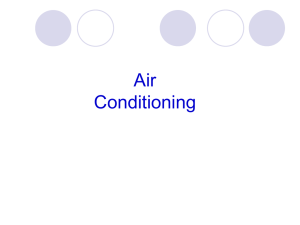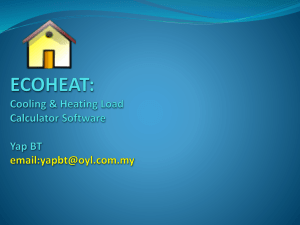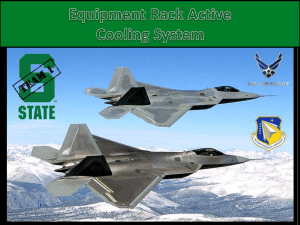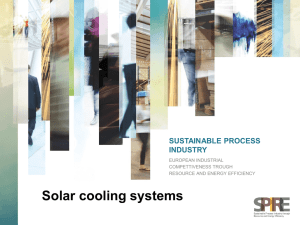Laser Cooling of Molecules: A Theory of Purity Increasing
advertisement
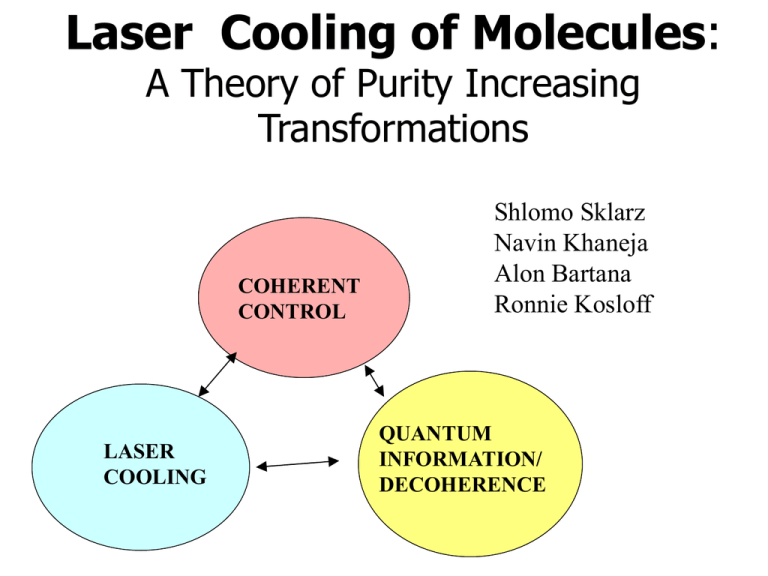
Laser Cooling of Molecules:
A Theory of Purity Increasing
Transformations
COHERENT
CONTROL
LASER
COOLING
Shlomo Sklarz
Navin Khaneja
Alon Bartana
Ronnie Kosloff
QUANTUM
INFORMATION/
DECOHERENCE
The Challenge: Direct Laser Cooling of Molecules
ATOMS
MOLECULES
Why traditional laser cooling fails for molecules
3 Laser Cooling Schemes
I) DOPPLER COOLING
TD=hg/2KB
240mK
Force
II) SISYPHUS COOLING
TR=h2k2/2MKB
2.5mK
III) VELOCITY SELECTIVE COHERENT
POPULATION TRAPPING (VSCPT)
T=0?
nK
n,s+
|b-,p-hk>
n,s|b+,p+hk>
Energy
|a,p>
Normalized velocity
Atomic Position
I) Atom Cooling Schemes
Questions:
• Each new scheme seems to come out of the
blue. Is there a systematic approach?
• Can the efficiency be improved?
• Where is the thermodynamics?
II) Optimal Control Theory.
Tannor and Rice 1985 (Calculus of variations)
Peirce, Dahleh and Rabitz 1988
Kosloff, Rice, Gaspard, Tersigni
and Tannor 1989
Introduction to Optimal Control
i
H[(t)] (t)
t
equations of motion
with control
J lim (T) | P | (T)
(penalty) objective
t
( 0)
(T )
( 0)
(T )
i
(t) [ b | m | a - b | m | a ]
Iteration!
optimal field
Tannor, Kosloff, Rice (1985-89)
Rabitz et al. (1988)
Optimal Control of Cooling
1
H[( t )], +
t i
Bartana, Kosloff and Tannor,
1993, 1997, 2001
1
+
+
{[ Vi, Vi ] + [Vi , Vi ]}
2 i
ˆ
J lim (T)A
T
ˆ | 0 0 |
A
(T)
(0)
ˆ (0)
A
(t)
-i
dissipation
ˆ
A
ˆ)
- L+ (A
t
ˆ (T )
A
ˆ cm
ˆ Aˆ e + (
ˆ gm
ˆ - m
ˆ
ˆ e ) Aˆ c - m
ˆ
ˆ c Bˆ g ] optimal field
Tr[
Laser Cooling of Molecules:
Vibrations + Rotations
Optimal Control meets Laser
Cooling
VIBRATIONS
Absorption
Stimulated Emission
Spontaneous Emission
ROTATIONS
Rotational Selective Coherent Population Trapping
Hˆ e
- j ( t )mˆ j
j
Hˆ
*
Hˆ g
- j ( t ) mˆ j
j
Hˆ B l(l + 1)
e/g
e/g
--Projection onto |0><0|
--Largest eigenvalue of
--Purity Tr(2)
What is Cooling?
P
n
P
1
n
n
P
n
n
2
n
P
1
n
Tr( ) 1
2
1
2
1
n
Tr(2) is a measure of coherence. The essence of
cooling is increasing coherence!
PHASE SPACE PICTURE
Aˆ Tr Aˆ
ˆ Tr
2
TrW
2
W
1
2
dpdqW2 ( p,q)
Bombshell: Hamiltonian Manipulations
Cannot Increase Tr(2)!
i1 H[(t)],
Control
2
Tr( ) 2Tr( ) i2 Tr([H, ]) 0
(Ketterle + Pritchard 1992)
Tr( 2 ) 1
Need Dissipation:
H
[ , ] +
i
1
+
+
{[ Vi, Vi ] + [Vi , Vi ]}
2 i
2
T r( ) 2T r() 0
BUT DISSIPATION () CANNOT BE CONTROLLED!
Bombshell: Hamiltonian Manipulations
Cannot Increase Tr(2)!
i1 H[(t)],
Control
2
Tr( ) 2Tr( ) i2 Tr([H, ]) 0
(Ketterle + Pritchard 1992)
Tr( 2 ) 1
Need Dissipation:
H
[ , ] +
i
1
+
+
{[ Vi, Vi ] + [Vi , Vi ]}
2 i
2
T r( ) 2T r() 0
BUT DISSIPATION () CANNOT BE CONTROLLED!
Questions:
• How can cooling be affected by external fields?
• What are the general rules for when spontaneous emission leads to
heating and when to cooling?
T r( 2 ) 2T r(ρΓρ.3)
T r(2 )
.7
1
1
+
g
-
+
+
0,0
g
d
0,0
1
1
0
.1
.99
a b
c d
d
1
a + d 1
bc ad
bc gad
0 g 1
Interplay of control fields and spontaneous emission
2)
T r(
1
g
+
+
+
0,0
T r(2 )
-
1
-
g
d
1
•Optimal cooling strategy
0,0
2
d
1
) + T r(2 )
maxT r(
d,g
Strange but interesting form!
•Physical significance of optimal strategy
1
1
keep coherence off the off-diagonal.
T2
2T1
~
•Algorithm: optimal trajectory d, g T r(2 ) d, ~
2)
g T r(
Tr( 2 ) 1 - 2Tr( 2 ) + 2Tr( 2 ) - 1
Diff. eq. for Tr(2) vs t: 3rd law of thermodynamics!
Purity Increasing Transformations:
Bloch Sphere Representation
Purity
decreasing
11
21
.2
Tr( ) Dissipative
Tr(2) Unitary
12
22
Purity
increasing
.2
• Tr( ) does depend on the control E(t) indirectly
Constant T (uncontrollable)
Constant S (controllable)
Carnot cycle
Spontaneous emission (uncontrollable)
Laser Cooling
Coherent Fields (controllable)
Thermalization, Collisions (uncontrollable)
Evaporative Cooling
Trap Lowering (controllable)
Universality of the interplay of
controllable + uncontrollable in cooling
Beyond two-level systems:
Two simplifying assumptions
•
Instantaneous unitary control
– U= eiH[E]t is infinitely fast compared with
– Criterion: wijg
•
Complete unitary control
–
–
Any U in SU(N) can be produced by eiH[E]t
Lie algebra criterion: dim {H, H1…}LA=N2-1
Complete and Instantaneous Unitary Control
Representation of the problem in
terms of spectral transformations
1
L
2
L2
L2=U+2U
L1=U+1U
L1
Modified Control problem
I
II
i
Eqn. of Motion - [H , ] +
Control
E(t)
Objective
Tr( ),
2
U(t)
‘Greedy’ strategy for
3 level L system is optimal
• The ‘Greedy’ strategy:
– Maximize dP/dt at each instant
– Maintain maximal population
of the excited state
– Keep
• Diagonal (Q={P} )
(No coherences)
• and Ordered (P=I)
(Ordered Eigenvalues)
• Theorem:
The greedy trajectorydiag()=
is optimal
THERMODYNAMICS
0th law of thermo
Definition of Cooling
Tr(2)
Tr(2)=0
for Hamiltonian
manipulations
2nd law of thermo
Optimal
Control
Theory
3rd law of thermo
Conclusions
• New frontier for optimal control
• Increasing Tr(2)= increasing coherence
is relevant to more than laser cooling!
• It may be profitable to reexamine existing laser cooling schemes in light
of purity increase. There is the potential for great improvement in
rate/efficiency by exploiting all spontaneous emission.
33
• Potentially new strategies for cooling molecules
• Thermodynamic analysis of laser cooling
0th, 2nd + 3rd law
LASING
Re
IWL 21
LWI
COOLING
• Cooling and Lasing as complementary Processes
Lasing as cooling light!
Kocharovskaya + Khanin
1988
Thermodynamics of
light-matter interactions
1
Pss 0
H
2
ss
Q H 0
C
ss
Q C 0
0
Erez Boukobza
N-Level systems: Complete treatment
(with Navin Khaneja)
Geometrical principals
[N. Khaneja et al Phys. Rev. A, 63 (2001) 032308].
• G-unitary group
• K-subgroup generated by the control
Hamiltonians, K=exp({Hj}LA).
• G/K quotient space where each point
represents some coset KU.
[1]
• Motion within a coset is fast and
governed by the controls
• Motion between cosets is slow
and determined by H0.
•G- “Liouville group”
•K- subgroup generated by the control
Hamiltonians, assumed to be the whole unitary
group U(N).
U
G
V
KV
KU
•Hamiltonian Motion is fast and
governed by the controls
•Purity changing Motion is slow
and determined by dissipation
•The problem reduces to finding the fastest way to get between cosets in
G/K space
Hamilton-Jacobi-Bellman Theorem
(Dynamical Programming)
5
6
V(,t)
5
5
6
6
6
5
5
5
4
4
6
3
5
6
4
6
3
3
2
4
4
4
6
4
5
t
1
Hamilton-Jacobi-Bellman
Theorem
•
•
•
•
Guaranteed to give GLOBAL maximum.
Capable of giving analytic optimal solutions.
Very Computationally expensive.
A possible method of solution:
guess optimal strategy and prove that HJB equations are satisfied.
‘Greedy’ strategy for N+1 level
system;
|2
gn
|1
g3
|3
Spectral
Spectralevolution
evolution
g4
|4
Greedy=
|n
1. No coherences
Q={Pi}
2. Ordered
Eigenvalues
Pi=I
populations)
g1
|4
g1 g
2
|1
time
|2
g3
|3
4 levels
populations)
=[0.05, 0.045, 0.0001]
|4
Investment
Return
g1 g
2
|1
time
|2
g3
|3
Summary
• The ‘Greedy’ cooling strategy is optimal for the
three-level L system
• ‘Investment & Return’ strategies rather than
‘Greedy’ are optimal for N>3 level systems
Coherences are required for optimality

